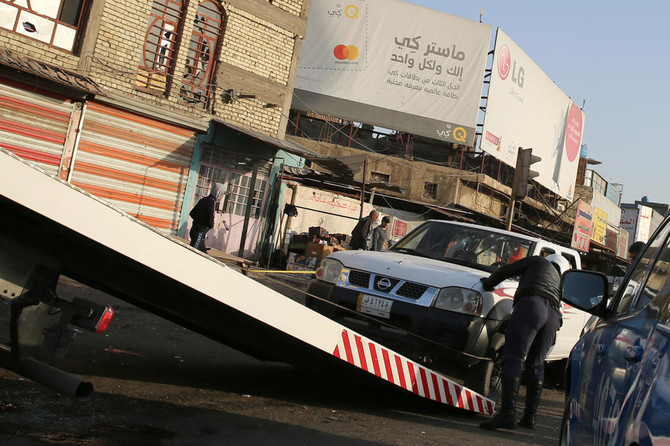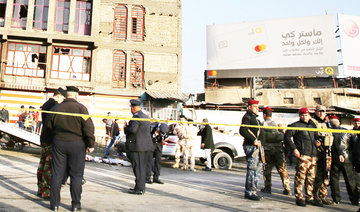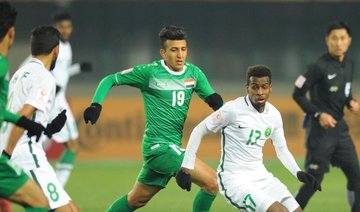BAGHDAD: Iraq’s Prime Minister Haider Abadi called for the elimination of Daesh “sleeper cells” on Monday after a twin suicide bombing killed 38 people in Baghdad in the second such attack in three days.
There was no immediate claim of responsibility, but most such attacks in Iraq are the work of Daesh.
The bombing comes after Abadi’s government declared victory over Daesh in December and as the country gears up for parliamentary elections.
“Two suicide bombers blew themselves up in Tayyaran Square in central Baghdad,” said Gen. Saad Maan, spokesman for the Joint Operations Command which includes the army and police.
Tayyaran Square is a bustling commercial center and a place where day laborers gather in the early morning waiting for jobs. It has been the site of deadly attacks in the past.
Iraqi analyst Hisham Al-Hashemi said attacks at the square since 2011 have killed 180 people, “often in the run-up to elections or just after the polls.”
They aim to “create chaos and exacerbate sectarian divisions,” he said.
Security forces cordoned off the scene of the blasts as ambulances gathered in the area, said an AFP journalist.
Abadi held an emergency meeting with the Joint Operations Command and intelligence officials after the attack, his office said, asking them to “eliminate Daesh sleeper cells” and ensure the security of civilians.
Analysts have warned that Daesh would increasingly turn to such tactics as it was pushed underground after losing territory spanning the Iraq-Syria border.
Just hours after the first attack, another person was killed and three wounded in a grenade explosion east of Baghdad, the police said, blaming it on a tribal dispute.
Attacks increased in Baghdad after the start in 2016 of a battle to retake second city Mosul from Daesh. Iraqi forces retook the northern city in July last year.
In December, the government announced the “end of the war” against Daesh, which has been expelled from the Baghdad region and urban areas of Iraq that it controlled. Terrorist elements are still active, however.
On Saturday, a suicide bomb attack near a security checkpoint killed at least five people in northern Baghdad. There was no immediate claim of responsibility for that bombing.
And last November, Daesh claimed an attack by suicide bombers on a market on the outskirts of Baghdad that killed 11 people.
The latest attacks come as Iraq gears up for elections in May, with voters deeply concerned about security in a country wracked by violence since the 2003 US-led invasion.
On Sunday, Abadi said he would stand for re-election in the parliamentary polls as the head of a new coalition.
Abadi’s newly created “Victory Alliance” will compete against the “State of Law” bloc of Nuri Al-Maliki, his predecessor and a key rival who now holds the post of vice president.
Both Abadi and Al-Maliki are members of the Shiite Dawa party.
Abadi was little known when he became premier three years ago, after Al-Maliki ceded power to him in August 2014 amid Daesh’s sweeping offensive across the country.
Since taking over, Abadi has also rebuilt the armed forces and taken back disputed areas in the north from the Kurds, dashing their hopes for independence.
He has succeeded in convincing the Hashd Al-Shaabi that helped fight Daesh, to join his “Victory Alliance.”
The Popular Mobilization Units are now seeking to become a key political player in Iraq after proving to be a formidable force on the battlefield.
Baghdad twin suicide bombing kills 38
Baghdad twin suicide bombing kills 38

EU medical aid crosses into Syria from Turkiye

ISTANBUL: Some 55 tonnes of EU-funded medical supplies entered northwestern Syria from Turkiye on Thursday, a UN health official said.
Part of an EU air bridge to Syria, the supplies crossed Turkiye’s southern Cilvegozu border post and were taken to a warehouse in the northwestern city of Idlib, Mrinalini Santhanam of the World Health Organization said.
“There’s one more air bridge, and it is planned for February,” she said, adding that it was “still in the planning stages” with talks “to determine the volume and the scale.”
The supplies, distributed to Idlib and the Aleppo region health care centers, are part of an EU humanitarian bridge announced by Brussels on Dec. 13.
The aim is to support Syria’s battered healthcare system following the ouster of Bashar Assad on Dec. 8.
Included in the shipment were 8,000 emergency surgical kits, anesthetic supplies, IV fluids, sterilization materials, and medications to prevent disease outbreaks, the WHO said.
The civil war, which broke out in 2011, devastated Syria’s health care system, with “almost half of the hospitals (there) not functional,” WHO planning analyst Lorenzo Dal Monte said in late December.
He said the 50-tonne shipment from Dubai included “mainly trauma and surgical kits.”
Another five tonnes of supplies were brought in from another stockpile in Demark, including emergency health kits as well as winter clothing and water purification tablets, the WHO said.
Polish government to protect Israel's Netanyahu from arrest if he attends Auschwitz event

- It remains unclear if Netanyahu wanted to attend the event
- The Polish government vowed to ensure the safe participation of Israeli representatives
WARSAW: The Polish government adopted a resolution on Thursday vowing to ensure the free and safe participation of the highest representatives of Israel — including Prime Minister Benjamin Netanyahu — who choose to attend commemorations for the 80th anniversary of the liberation of Auschwitz-Birkenau later in January.
Netanyahu became an internationally wanted suspect last year after the International Criminal Court (ICC), the world’s top war crimes court, issued an arrest warrant for him in connection with the war in the Gaza Strip, accusing him of crimes against humanity over the death of more than 45,000 Palestinians, the majority of them women and children, since October 2023.
“The Polish government treats the safe participation of the leaders of Israel in the commemorations on January 27, 2025, as part of paying tribute to the Jewish nation,” read the resolution published by the office of Prime Minister Donald Tusk.
The government published the statement after Polish President Andrzej Duda asked Tusk to ensure that Netanyahu can attend without the risk of being arrested.
There had been reports suggesting that the ICC arrest warrant could prevent Netanyahu from traveling to Poland to attend observances marking the anniversary of the liberation in 1945 of the Auschwitz-Birkenau death camp by Soviet forces on Jan. 27.
Member countries of the ICC, such as Poland, are required to detain suspects facing a warrant if they set foot on their soil, but the court has no way to enforce that. Israel is not a member of the ICC and disputes its jurisdiction.
The court has more than 120 member states, though some countries, including France, have already said they would not arrest Netanyahu.
Hungarian Prime Minister Viktor Orbán even said he would defy the warrant by inviting him to Hungary.
It was not even clear if Netanyahu wanted to attend the event. The Polish Foreign Ministry said earlier Thursday that it has not received any information indicating that Netanyahu will attend the event.
US, French troops could secure Syria’s northern border, Syrian Kurdish official says

- Turkiye regards the YPG, which spearheads the US-allied Syrian Democratic Forces (SDF), as a terrorist group linked to Kurdish PKK militants
- Ilham Ahmed: ‘We ask the French to send troops to this border to secure the demilitarised zone, to help us protect the region and establish good relations with Turkiye’
PARIS: Talks are taking place on whether US and French troops could secure a border zone in northern Syria as part of efforts to defuse conflict between Turkiye and Western-backed Kurdish Syrian forces, a senior Syrian Kurdish official said.
Ankara has warned that it will carry out a cross-border offensive into northeastern Syria against the Kurdish YPG militia if the group does not meet Turkish demands.
Turkiye regards the YPG, which spearheads the US-allied Syrian Democratic Forces (SDF), as a terrorist group linked to Kurdish PKK militants who for 40 years have waged an insurgency against the Turkish state.
The SDF played an important role in defeating Daesh in Syria in 2014-17. The group still guards Daesh fighters in prison camps there, but has been on the back foot since rebels ousted Syrian President Bashar Assad on Dec. 8.
French President Emmanuel Macron said earlier this week that Paris would not abandon the SDF, which was one among a myriad of opposition forces during Syria’s 13-year-long civil war.
“The United States and France could indeed secure the entire border. We are ready for this military coalition to assume this responsibility,” Ilham Ahmed, co-chair of foreign affairs for the Kurdish administration in northern territory outside central Syrian government control, was quoted as saying by TV5 Monde.
“We ask the French to send troops to this border to secure the demilitarised zone, to help us protect the region and establish good relations with Turkiye.”
Neither France nor Turkiye’s foreign ministries immediately responded to requests for comment. The US State Department was not immediately available for comment.
It is unclear how receptive Turkiye would be to such an initiative, given Ankara has worked for years to secure its border against threats coming from Syria, and has vowed to destroy the YPG.
“As soon as France has convinced Turkiye to accept its presence on the border, then we can start the peace process,” Ahmed said. “We hope that everything will be settled in the coming weeks.”
A source familiar with the matter said such talks were going on, but declined to say how advanced or realistic they were.
Washington has been brokering ceasefire efforts between Turkish-backed groups and the SDF after fighting that broke out as rebel groups advanced on Damascus and overthrew Assad.
Addressing a news conference in Paris alongside outgoing US Secretary of State Antony Blinken, French Foreign Minister Jean-Noel Barrot hinted that there were talks on the issue.
“The Syrian Kurds must find their place in this political transition. We owe it to them because they were our brothers in arms against Islamic State,” Barrot said.
“We will continue our efforts ... to ensure that Turkiye’s legitimate security concerns can be guaranteed, but also the security interests of (Syria’s) Kurds and their full rights to take part in the construction in the future of their country.”
Blinken said it was vital to ensure that the SDF forces continued the job of guarding more than 10,000 detained Daesh militants as this was a legitimate security interest for both the US and Turkiye.
“We have been working very closely with our ally ... Turkiye to navigate this transition ... It’s a process that will take some time,” Blinken said.
The US has about 2,000 troops in Syria who have been working with the SDF to prevent a resurgence of Daesh.
A French official said France still has dozens of special forces on the ground dating from its earlier support of the SDF, when Paris provided weapons and training.
Macron to head to Lebanon after election of new president

- France “will continue to be at the side of Lebanon and its people,” Macron told Aoun in a telephone call
- France administered Lebanon for two decades after World War I and has maintained close ties even since its independence in 1944
PARIS: French President Emmanuel Macron on Thursday welcomed the “crucial election” by Lebanese lawmakers of army chief Joseph Aoun as president and said he would soon visit the country.
Macron spoke with the general hours after Aoun was announced as the leader to end a two-year vacuum in the country’s top post.
France “will continue to be at the side of Lebanon and its people,” Macron told Aoun in a telephone call, the French presidency said in a statement. Macron said he would go to Lebanon “very soon.”
“Congratulations to President Joseph Aoun on this crucial election,” Macron wrote on X earlier.
“It paves the way for reform and the restoration of Lebanon’s sovereignty and prosperity,” he added.
Aoun must oversee a ceasefire in south Lebanon and name a prime minister able to lead reforms demanded by international creditors to save the country from a severe economic crisis.
“The head of state indicated to President Aoun that France would support his efforts to quickly complete the formation of a government capable of uniting the Lebanese, answering their aspirations and their needs, and carrying out the reforms necessary for the economic recovery, reconstruction, security and sovereignty of Lebanon,” said the statement released after the telephone talks.
Macron also vowed support for the “national dialogue” that Aoun said he will launch and called on all groups to “contribute to the success of his mission,” the statement said.
France administered Lebanon for two decades after World War I and has maintained close ties even since its independence in 1944.
Israel rallies global support to win release of a woman believed kidnapped in Iraq

- The official said Thursday that the matter was raised in a meeting of special envoys for hostage affairs in Jerusalem this week
- Israel and Iraq do not have diplomatic relations
JERUSALEM: A senior Israeli official says the government is working with allies in a renewed push to win the freedom of an Israeli-Russian researcher who is believed to have been kidnapped in Iraq nearly two years ago.
The official said Thursday that the matter was raised in a meeting of special envoys for hostage affairs in Jerusalem this week.
He said the envoys met the family of Elizabeth Tsurkov and that Israel asked the representatives – from the US, UK, Germany, Austria and Canada – to have their embassies in Baghdad lobby the Iraqi government and search for a way to start negotiations. Israel and Iraq do not have diplomatic relations. He said he hopes other countries will help.
“We are counting on our allies,” the official said, speaking on condition of anonymity because he was discussing closed-door discussions. “And I hope that other nations will suggest assistance in helping us release Elizabeth. Many nations have embassies and contacts with the Iraqi government.”
Tsurkov, a 38-year-old student at Princeton University, disappeared in Baghdad in March 2023 while doing research for her doctorate. She had entered the country on her Russian passport. The only sign she was alive has been a video broadcast in November 2023 on an Iraqi television station and circulated on pro-Iranian social media purporting to show her.
No group has claimed responsibility for the kidnapping. But Israel believes she is being held by Kataib Hezbollah, an Iranian-backed Iraqi militia that it says also has ties to the Iraqi government.
The Israeli official said that after months of covert efforts, Israel believes the “changes in the region” have created an opportunity to work publicly for her release.
During 15 months of war, Israel has struck Iran and its allies, and Iran’s regional influence has diminished. Iraq also appears to have pressured militia groups into halting their aerial attacks against Israel.




















